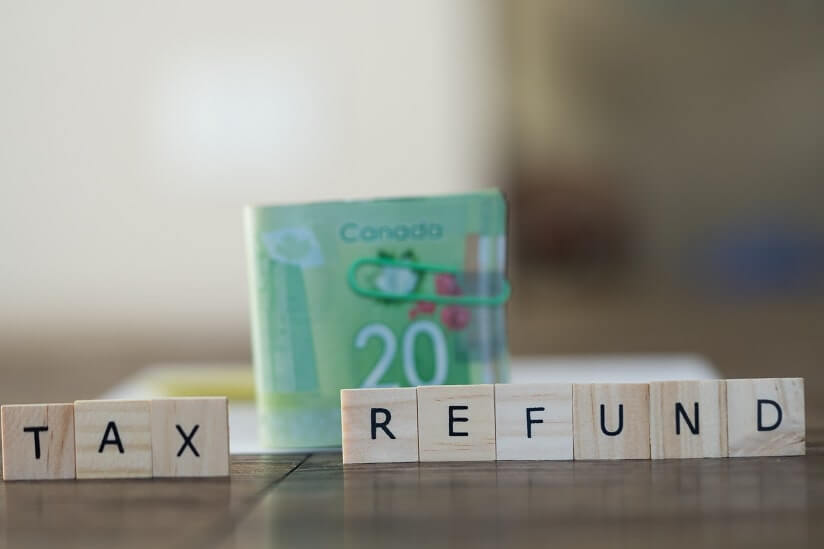Ignoring your tax obligations is a bad idea when you live and work in Canada because even a small mistake could prove costly. Who needs the stress?
Use these tax tips below to get prepared so you can get on with living the good life, oh and know how to file your Canadian tax return.
1. Apply for a Social Insurance Number
It’s important to apply for a Social Insurance Number before you start a job in Canada so you can be taxed correctly.
A SIN is a unique 9 digit number assigned to you by the Canadian Government for tax purposes.
Bring your passport and work permit to prove you are you.
They will ask for a permanent address too but you can use your place of work, a hostel or a friend’s address if you don’t have one yet.
You can apply for a SIN before you go.
2. Determine your residency status
There is a tax-free threshold in Canada which means you may earn up to a certain amount without paying tax.
There are only a few small exceptions. However, anything over this amount and you will need to pay tax.
How much tax you pay depends on a number of things but one of the main factors is residency.
There are different rules for residents and non-residents when it comes to your taxes so it’s a good idea to know which status applies to you.
Generally, you are a non-resident for tax purposes if you:
Normally, customarily, or routinely live in another country and are not considered a resident of Canada
or don’t have significant residential ties in Canada and you lived outside Canada throughout the tax year
or you stayed in Canada for less than 183 days in the tax year
Typically you’ll be considered a resident if:
Canada is the place where you in the settled routine of your life, regularly, normally or customarily live.
For example, if you are married to a Canadian citizen and you have the intention to settle in Canada or have applied for residency and you have a home in Canada, you’ll be considered a resident.
If you’ve never filed a tax return and are on a 1 or 2-year working holiday visa and plan on staying for the duration, you should file as a non-resident for tax purposes.
The Canadian Revenue Agency or a professional tax preparer like Taxback.com can help you determine your residency status.
Once you know what your status is, you should read the rules:
Non-residents
- Any income earned outside Canada should be declared
- You will not be taxed on your foreign income but the amount will affect how many non-refundable tax credits you’re entitled to
- For example, the Canadian tax office will let you earn up to the tax-free threshold if 90% or more of your earnings for that year were earned in Canada. You should not claim the credits if you earn 10% or more of your income from outside Canada
Residents
- Income earned outside Canada must be declared
- You are taxed on your worldwide income
- If you move to Canada with the intention to settle, anything earned up to that point should be declared, but you won’t be taxed on it and for that year you will be treated as non-resident
3. Forms
Here comes the fun part! Canada has both Federal and Provincial taxes. You will need to fill in some forms:
This form is your Personal Tax Credits Return which is used to determine how much tax should be deducted from your income.
There are federal and provincial TD1 forms. If you do not fill out Form TD1, your employer will deduct taxes after allowing the basic personal amount only.
What to consider:
- A non-resident employee cannot claim the credits if they earned more than 10% of income from outside Canada in the tax year (Jan 1-Dec 31). If this is the case, enter “0” on line 13, and do not fill in lines 2 to 12 as you are not entitled to the personal tax credits.
- If a non-resident or resident worker works for more jobs at the same time, they can only claim credits for 1 job. If you are working 2 jobs from Jan-May for example, you should claim the credits for the job that is the highest-paid.
- If you have more than one employer at the same time and have already claimed personal tax credit amounts on another Form TD1 for one employer, you cannot claim them again.
- If you make a mistake or need to amend it, you can change your credits at any time by submitting a new form.
Read Also:
FIVE IMPORTANT CANADIAN WORKING HOLIDAY TAX TIPS FOR LAST-MINUTE FILERS
The Provincial form you fill in will depend on where you work:
- TD1BC – British Columbia
- TD1AB – Alberta
- TD1ON – Ontario
- TD1SK – Saskatchewan
- TD1MB – Manitoba
- TD1NU – Nunavut
- Quebec – FormTP-1015.3-V, Source Deductions Return
You’ll need to complete a TD1 when you start a new job, but also if:
- You want to change the amount from previous claimed tax years
- You want to claim the deduction for living in a prescribed zone
- You want to increase the amount of tax deducted at source
- You are changing employers
4. Expenses
You may be able to claim a number of expenses when you work in Canada.
Medical Expenses

You may be able to claim medical expenses you have paid for yourself.
Common eligible medical expenses include gluten-free products for coeliacs, medical services by qualified practitioners, orthodontic work, and prescription drugs and medications.
You can claim these on line 330 or 331 of Schedule 1 Federal Tax of your income tax and benefit return.
Your expenses should total more than 3% of your net income or $2,208, whichever is less.
You will need to keep any receipts, prescriptions, or certificates required to support your claim in case the Canadian Revenue Agency comes calling!
Moving Expenses
If you moved from one location to another in Canada in the tax year, you might be able to claim moving expenses on that year’s return.
You must have started a job or carried out business at your new location and the new place must be at least 40Km closer to your employment.
Public Transport
You can claim the cost of monthly/yearly transit passes within Canada. You can also claim the cost of shorter passes if they allow you unlimited travel for at least 5 consecutive days and you have enough of them that they add up to unlimited travel for at least 20 days within a 28 day period.
You or your spouse/common-law partner can claim on the cost of transit passes for yourself/your spouse/common-law partner/child if they are under 19 yrs on 31 Dec of the year to which the claim relates.
Keep all your passes and documents in a safe place.
Business expenses

If you are self-employed in Canada you may be able to claim a number of business expenses on your tax return.
The general rule is that you can deduct any reasonable expense you incurred in order to earn your business income. You cannot deduct personal expenses.
Common items include:
- Legal and accounting fees
- Telephone and utilities
- Travel
- Meals and entertainment
- Insurance
- Property taxes
- Motor vehicle expenses
Again, make sure you keep receipts in case you are the subject of an audit!
You May Also Like:
HOW LONG SHOULD YOU KEEP YOUR TAX RECORDS IN CANADA & WHY?
5. Watch for underpayments
There is no sure way to ensure you don’t end up with a balance owing when you file your tax return, however, there are a few simple tips to help you avoid it!
- Know what tax credits you are eligible for, e.g. don’t claim personal tax credits if you’ve earned more than 10% of your income from non-Canadian sources
- Don’t claim personal tax credits twice. If you work at multiple jobs at the same time, you must only claim the credits for one of these jobs.
6. Filing your tax return
Make sure you file your tax return by the deadline of May 1st with the Canadian Revenue Agency or use a professional tax preparer like Taxback.com to do all the paperwork!
If you are unsure about any of the above, you can email info@taxback.com or check out Taxback’s website





